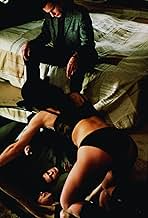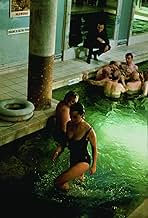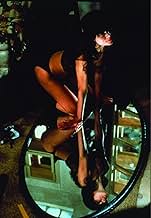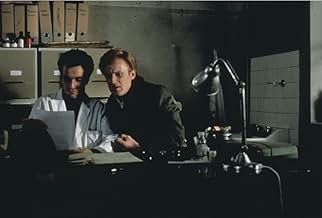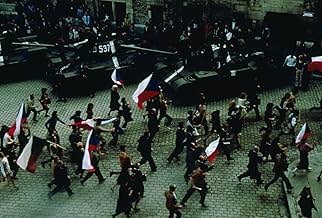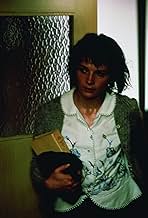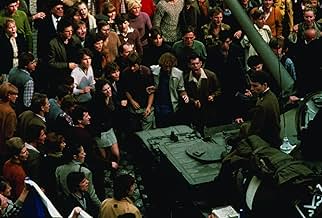L'insoutenable légèreté de l'être
Titre original : The Unbearable Lightness of Being
- 1988
- Tous publics
- 2h 51min
En 1968, un médecin tchèque dont la vie sexuelle est active rencontre une femme qui souhaite la monogamie. L'invasion soviétique va encore plus chambouler leur vie.En 1968, un médecin tchèque dont la vie sexuelle est active rencontre une femme qui souhaite la monogamie. L'invasion soviétique va encore plus chambouler leur vie.En 1968, un médecin tchèque dont la vie sexuelle est active rencontre une femme qui souhaite la monogamie. L'invasion soviétique va encore plus chambouler leur vie.
- Réalisation
- Scénario
- Casting principal
- Nommé pour 2 Oscars
- 7 victoires et 14 nominations au total
Pavel Landovský
- Pavel
- (as Pavel Landovsky)
Stellan Skarsgård
- The Engineer
- (as Stellan Skarsgard)
Tomasz Borkowy
- Jiri
- (as Tomek Bork)
Pavel Slabý
- Pavel's Nephew
- (as Pavel Slaby)
László Szabó
- Russian Interrogator
- (as Laszlo Szabo)
Avis à la une
I would have to disagree with the previous reviewer. First of all, the movie should have a "euro" feel to it because it's about Europeans, in Europe, and their European mentality. No car chases here, hot shot. That being said, I only have great praise for this film. It's a tremendous attempt to put to screen the subtle understanding Milan Kundera has of the human condition, and it surprisingly succeeds. For those more interested, I recommend you pick up some of his novels (start with a short story if you are pressed for time) and you, too, will realize why he is one of the best storytellers alive today.
Milan Kundera's masterwork is one of the most profound, powerful and perspicacious work of literary fiction of all-time. However, as one either already knows or soon discovers: a novel and a film are completely different media.
Kaufman's vision is elegant, eloquent and enigmatic. This is necessary to translate the directness and deepness of Kundera's prose. The film unable to delve into the innermost feelings and proclivities of its characters tries to say more by saying less. The movie takes the essence and uses powerful, calculated imagery as its driving motor. This is how this strongly resembles the late Stanley Kubrick's work: meticulous, hard on the actors and often also demanding on the viewers.
Kundera is heard throughout by having some of its most essential prose and ideas integrated into the dialog now and then, but as you've probably guessed, the film cannot capture the sublime subtleties and evocative expansions of the novel. Franz's and Sabina's "dictionary of incomprehension" is only hinted at, while Tomas' son is nonexistent and Tereza's turning moment at the mountain foregone. The focus is highly on the sensuality and, primate, playful to intimate, infidelity. This was a good choice as this dichotomy requires little words to be heard. However, when the characters do speak, the dialog dashes across the screen and dances in your head to be sure. The political overtone is also present with the departure and return to Prague being treated as almost opposite end of a colour spectrum. Kundera hypothesizes on how politics and nudity are one and the same, but Kaufman shows it with vivid imagery on both sides and emblematic parallelism.
The acting and editing make it all work together although there are a few low points in both instances. The two female leads are pretty much incredible. The classic music is charming and appropriate. The writing and directing are on point and the philosophy and melancholy of Kundera finds an appropriate echo in this visceral art medium.
With a slow beginning, the movie quickly builds momentum and the viewer hardly realizes its long running time. The character interactions and tensions, the stunning cinematography and succession of memorable scenes and dialog inspired greatly by the original work, make the viewer actually wish the movie would go on a little longer, whisper something more to its ear. Tomas sums it up by stating his general happiness despite his unforeseen and unwanted condition. After all life is light, you cannot take it too seriously.
Kaufman's vision is elegant, eloquent and enigmatic. This is necessary to translate the directness and deepness of Kundera's prose. The film unable to delve into the innermost feelings and proclivities of its characters tries to say more by saying less. The movie takes the essence and uses powerful, calculated imagery as its driving motor. This is how this strongly resembles the late Stanley Kubrick's work: meticulous, hard on the actors and often also demanding on the viewers.
Kundera is heard throughout by having some of its most essential prose and ideas integrated into the dialog now and then, but as you've probably guessed, the film cannot capture the sublime subtleties and evocative expansions of the novel. Franz's and Sabina's "dictionary of incomprehension" is only hinted at, while Tomas' son is nonexistent and Tereza's turning moment at the mountain foregone. The focus is highly on the sensuality and, primate, playful to intimate, infidelity. This was a good choice as this dichotomy requires little words to be heard. However, when the characters do speak, the dialog dashes across the screen and dances in your head to be sure. The political overtone is also present with the departure and return to Prague being treated as almost opposite end of a colour spectrum. Kundera hypothesizes on how politics and nudity are one and the same, but Kaufman shows it with vivid imagery on both sides and emblematic parallelism.
The acting and editing make it all work together although there are a few low points in both instances. The two female leads are pretty much incredible. The classic music is charming and appropriate. The writing and directing are on point and the philosophy and melancholy of Kundera finds an appropriate echo in this visceral art medium.
With a slow beginning, the movie quickly builds momentum and the viewer hardly realizes its long running time. The character interactions and tensions, the stunning cinematography and succession of memorable scenes and dialog inspired greatly by the original work, make the viewer actually wish the movie would go on a little longer, whisper something more to its ear. Tomas sums it up by stating his general happiness despite his unforeseen and unwanted condition. After all life is light, you cannot take it too seriously.
I've not read the book this is based on, so have no way to comment on how this movie translates it. But the film itself has stayed in my mind like few others. Yes, it's very long, but the characters are so memorable that the length didn't bother me at all - I loved the time spent in their company. In particular, Juliette Binoche and Lena Olin are each astonishing in their own way. Olin is ferociously sensual and mesmerizing, while Binoche is superlatively sympathetic and sensitive. Two of the best female performances I can remember. By the end of the film I was totally wrapped up in these people's lives. This film is deeply erotic but in an intelligent and adult way that puts most other film's treatment of sex to shame. I thought it was beautifully handled by all concerned, and if I ever want to cry, I only need watch the scenes with the dog and the final scenes, both pulled off superbly.
The Unbearable Lightness of Being (1988)
I liked this book a lot, and I like director Philip Kaufman's approach to movies. The best of this movie is terrific, as well: the wild culture of personal and cultural freedom at the start, the chilling invasion of Soviet tanks in the center, and the last half hour of idealized romance and happiness in the country.
That kind of gives away the movie, it would seem. But in a way, the movie is about how all these things happen. This is where it gets to be about taste and patience. It's a long movie, and much of the events are not really a development of plot, but a steady continuation of a variety of relationships (mainly between the lead man and the two main women). There is a plot behind all this, especially around their leaving Czechoslovakia and then finding a return to bliss in the Czech countryside, but this doesn't drive the movie overall.
For me, it wasn't enough to see these people enjoying sex and discovering conflicts between the three legs of the love triangle. Scenes were often leisurely in a way that implies we were glad to just be there and watch things happen within a pocket of frozen time, rather than through time. By that I mean, it wasn't where you were going with the emotional aspects, but it was where you were, the now of the interactions. The might actually be where the book was so successful--it created moods and scenes where you were, actually, glad to just be absorbed. For me, that wasn't always the case in the film version.
Part of the problem might just be Daniel Day Lewis, who is a bit too self-satisfied, not as a character (that is certain) but as an actor. He lacks the magnetism that might sustain the unlikely and ongoing love the two women have for him, even as they know about each other. On the other hand, it's a huge, epic tale about true freedom, and a very real pursuit of happiness. And when the energy gets going, and the mood is fully expanded, there is magic. Especially, again, at the end, including the famous fade to white in the last frames, it is about a kind of heaven on earth. Who can object to that?
I liked this book a lot, and I like director Philip Kaufman's approach to movies. The best of this movie is terrific, as well: the wild culture of personal and cultural freedom at the start, the chilling invasion of Soviet tanks in the center, and the last half hour of idealized romance and happiness in the country.
That kind of gives away the movie, it would seem. But in a way, the movie is about how all these things happen. This is where it gets to be about taste and patience. It's a long movie, and much of the events are not really a development of plot, but a steady continuation of a variety of relationships (mainly between the lead man and the two main women). There is a plot behind all this, especially around their leaving Czechoslovakia and then finding a return to bliss in the Czech countryside, but this doesn't drive the movie overall.
For me, it wasn't enough to see these people enjoying sex and discovering conflicts between the three legs of the love triangle. Scenes were often leisurely in a way that implies we were glad to just be there and watch things happen within a pocket of frozen time, rather than through time. By that I mean, it wasn't where you were going with the emotional aspects, but it was where you were, the now of the interactions. The might actually be where the book was so successful--it created moods and scenes where you were, actually, glad to just be absorbed. For me, that wasn't always the case in the film version.
Part of the problem might just be Daniel Day Lewis, who is a bit too self-satisfied, not as a character (that is certain) but as an actor. He lacks the magnetism that might sustain the unlikely and ongoing love the two women have for him, even as they know about each other. On the other hand, it's a huge, epic tale about true freedom, and a very real pursuit of happiness. And when the energy gets going, and the mood is fully expanded, there is magic. Especially, again, at the end, including the famous fade to white in the last frames, it is about a kind of heaven on earth. Who can object to that?
Imagine you're at the theater attending a live performance, a truly living performance in which both axioms and mythological truths are entered into and shared by actors and audience alike. Now suppose that the backdrop for all the action is dark, oppressive, and heavy, while all that transpires before it is light, glib, and ineffectual. Now consider that, through the course of the play, all that is bouncy and trivial becomes overwhelmed and absorbed by the gravity of the background, like light being sucked into the gravity of a black hole, so that what was once meaningless and unimportant and even silly becomes increasingly momentous and important and valuable as the play progresses. If you can see this outline in your mind's eye, you have a good idea about The Unbearable Lightness of Being, Milan Kundera's novel by the same name brought to life as a movie. The film, like the novel, declares one thing: `only necessity is heavy, and only what is heavy has value.' I so love this idea, this earth shattering insight: it effortlessly capsizes our Postmodern zeitgeist in one innocuous little phrase. And the film expresses it beautifully.
Set in the Prague Spring of 1968, when the Soviets put down Dubcek's `Socialism with a Human Face,' the weight of these events draws the lives of a Czech doctor, his wife, and his lovers, into its orbit. And instead of crushing them, as one might assume, it becomes the fire that purifies gold. Tomas (Daniel Day-Lewis), for example, had previously written a treatise on Oedipus, a witty exercise in sophistry aimed at the Communist regime as a provocative analogy, nothing more. But as the essay becomes an object of obsession to the Communists, we see Kundera's definition of vertigo come into play. It is not the fear of falling, but the soul's defense against the desire to fall. Tomas wanted to fall. Why? Watch the movie, and find out for yourself.
Set in the Prague Spring of 1968, when the Soviets put down Dubcek's `Socialism with a Human Face,' the weight of these events draws the lives of a Czech doctor, his wife, and his lovers, into its orbit. And instead of crushing them, as one might assume, it becomes the fire that purifies gold. Tomas (Daniel Day-Lewis), for example, had previously written a treatise on Oedipus, a witty exercise in sophistry aimed at the Communist regime as a provocative analogy, nothing more. But as the essay becomes an object of obsession to the Communists, we see Kundera's definition of vertigo come into play. It is not the fear of falling, but the soul's defense against the desire to fall. Tomas wanted to fall. Why? Watch the movie, and find out for yourself.
Le saviez-vous
- AnecdotesThe first cut shown to the studio was under two hours in length and the story was confusing. Philip Kaufman was asked to add in scenes he cut. The next day they were shown the theatrically released version. It's believed Kaufman showed them a shorter and confusing version in order to get his almost three-hour final cut approved with no questions of cutting it.
- GaffesMephisto the Pig, consistently referred to as "he", is a sow, as can be seen frequently, but particularly when the group enters the inn for dancing.
Meilleurs choix
Connectez-vous pour évaluer et suivre la liste de favoris afin de recevoir des recommandations personnalisées
- How long is The Unbearable Lightness of Being?Alimenté par Alexa
Détails
- Date de sortie
- Pays d’origine
- Sites officiels
- Langues
- Aussi connu sous le nom de
- La insoportable levedad del ser
- Lieux de tournage
- Prague, République tchèque(archive footage)
- Société de production
- Voir plus de crédits d'entreprise sur IMDbPro
Box-office
- Budget
- 17 000 000 $US (estimé)
- Montant brut aux États-Unis et au Canada
- 10 006 806 $US
- Week-end de sortie aux États-Unis et au Canada
- 202 189 $US
- 7 févr. 1988
- Montant brut mondial
- 10 006 806 $US
- Durée
- 2h 51min(171 min)
- Couleur
- Mixage
- Rapport de forme
- 1.85 : 1
Contribuer à cette page
Suggérer une modification ou ajouter du contenu manquant


